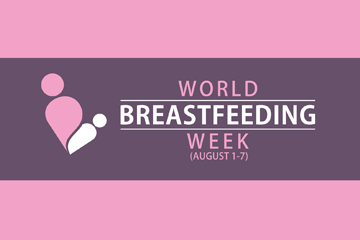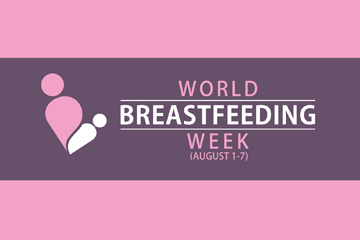Breastfeeding provides every child with the best possible start in life and is one of the most effective ways to ensure child health and survival. Every year, August 1-7 is observed as World Breastfeeding Week (WBW) to protect, promote and support breastfeeding. This global campaign helps to raise awareness about breastfeeding and urges action on themes related to the practice.
The theme of World Breastfeeding Week 2020 is: “Support breastfeeding for a healthier planet”. The theme of this year’s campaign highlights the links between breastfeeding and the environment/climate change. It primarily focuses on the impact of infant feeding on the environment/climate change and the imperative need to protect, promote and support breastfeeding for the health of the planet and its people.
Breastfeeding delivers health, nutritional and emotional benefits to both children and mothers. Many medical experts such as the American Academy of Pediatrics (AAP) and the American College of Obstetricians and Gynecologists recommend that breastfeeding exclusively (no formula, juice, or water) for 6 months is a must and breastfeeding for a year at least with other foods (such as vegetables, grains, fruits, proteins) should be started at 6 months of age.
The Lifelong Positive Health Effects of Optimal Breastfeeding are:
- Mother: Helps with birth spacing, reduces risk of breast and ovarian cancers and lowers the risk of hypertension.
- Infants/Babies/Children: Helps combat infectious diseases, decreases incidence and severity of diarrhea, lowers respiratory infections and acute otitis media, prevents dental caries and malocclusion, and increases intelligence.
Along with the many benefits that it provides for both mother and child, breastfeeding also set a major example of deep connections between human health and nature’s ecosystem. Breast milk is a natural, renewable food that is environmentally safe and green because it is produced and delivered to the consumer without pollution, packaging or waste. On the other hand, artificial feeding leaves a major environmental footprint that contributes to the depletion of natural resources, environmental degradation and greenhouse gas emissions that cause global warming and climate change (worldbreastfeedingweek.org).
Although breast milk is the ideal food for babies during the first 6 months of life, sometimes breastfeeding may not be possible. In these cases, artificial feeding can be done, where modified formulas adapted to the needs of infants – starter milk (suitable from birth to 6 months) and then follow-on milk (6 to 12 months) – are given.
Started in 1992, WBW is celebrated in remembrance of the 1990 Innocenti Declaration. Since 2016, WBW is aligned with the Sustainable Development Goals (SDGs) and in 2018, a World Health Assembly resolution endorsed WBW as an important breastfeeding promotion strategy. The World Alliance for Breastfeeding Action (WABA), a global network of individuals and organizations dedicated to the protection, promotion and support of breastfeeding, coordinates the global WBW campaign to enlighten, anchor, engage and galvanise action on breastfeeding and related issues.
While in some cases women are unable to breastfeed, others simply choose not to. Along with this year’s theme, WHO and UNICEF are calling on governments to protect and promote women’s access to skilled breastfeeding counselling, a critical component of breastfeeding support. The benefits of skilled breastfeeding counselling services are:
- It ensures that mothers and families get support, along with the information, guidance, and the encouragement they need to nourish their babies optimally.
- It builds confidence in mothers while respecting their individual circumstances and choices.
- It can empower women to overcome challenges and prevent feeding and care practices that may interfere with optimal breastfeeding, such as the provision of unnecessary liquids, foods, and breastmilk substitutes to infants and young children.
According to the World Health Organization (WHO), “improving access to skilled counselling for breastfeeding can extend the duration of breastfeeding and promote exclusive breastfeeding, with benefits for babies, families and economies. Indeed, analysis indicates that increasing rates of exclusive breastfeeding could save the lives of 820 000 children every year, generating US $302 billion in additional income”.
Skilled counselling can be provided in a variety of settings (in health facilities or clinics, through home visits or community programmes, in person or remotely) by different people – including health care professionals, lactation counsellors and peer support providers. Especially, during this pandemic period, to make sure that the access to these essential services does not get interrupted we have to find new, innovative methods, so that the families continue to receive their breastfeeding counselling in a safe and effective manner.
To make this happen, UNICEF and WHO, in line with the policy actions advocated by the UNICEF-WHO-led Global Breastfeeding Collective, are calling on governments to:
- INVEST
- TRAIN
- ENSURE
- PARTNER
- PROTECT
Celebrate #WBW2020 – Share your experiences and thoughts about the links between breastfeeding and environment/climate change on the WABA’s social media platforms


